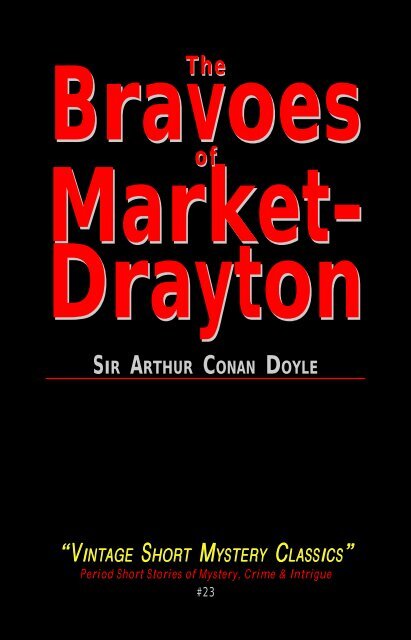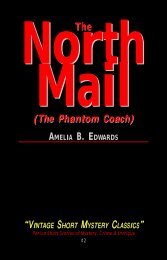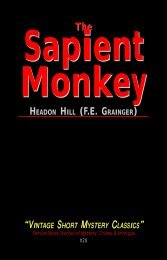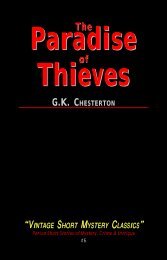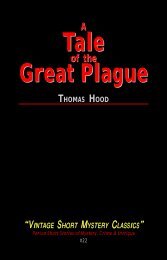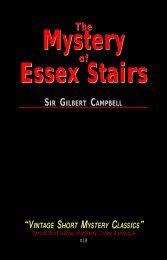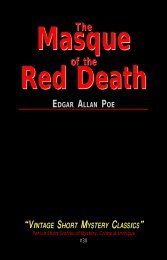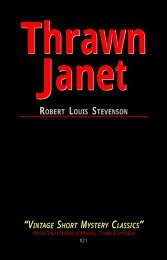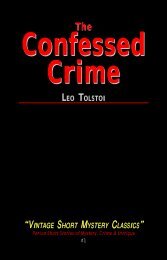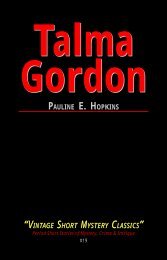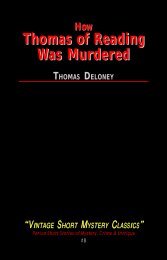The Bravoes of Market-Drayton - Hornpipe Vintage Publications
The Bravoes of Market-Drayton - Hornpipe Vintage Publications
The Bravoes of Market-Drayton - Hornpipe Vintage Publications
You also want an ePaper? Increase the reach of your titles
YUMPU automatically turns print PDFs into web optimized ePapers that Google loves.
<strong>Bravoes</strong><strong>Market</strong>-<strong>Drayton</strong><strong>The</strong><strong>of</strong>SIR ARTHUR CONAN DOYLE“VINTAGE SHORT MYSTERY CLASSICS”Period Short Stories <strong>of</strong> Mystery, Crime & Intrigue#23
All short stories in the “<strong>Vintage</strong> Short Mystery Classics” series areperiod works now in the public domain. <strong>The</strong>se e-book presentationsare published by:<strong>Hornpipe</strong> <strong>Vintage</strong> <strong>Publications</strong>P.O. Box 18428Spartanburg, SC 29318www.hornpipe.com/mysclas.htm“<strong>Vintage</strong> Short Mystery Classics” have been selected by Daniel EltonHarmon, author <strong>of</strong> “<strong>The</strong> Harper Chronicles,” with the intent <strong>of</strong> introducingnew readers to notable works <strong>of</strong> short historical fiction inthe mystery/gothic/crime vein. For more information, please visit theauthor’s Web site at www.danieleltonharmon.com.Shop-lifting is no capital <strong>of</strong>fense—but “sheep-lifting”most certainly was, during the time <strong>of</strong> this story, set in the 1820sin the Shropshire downs <strong>of</strong> England. “Fowl-stealing,” by contrast,incurred only “trifling punishment.”Meanwhile, the notion <strong>of</strong> paying hitmen to commit murderwas “happily unique in the annals <strong>of</strong> crime.” And the courtroomcondemnation <strong>of</strong> a witness’ own mother was regarded with morepr<strong>of</strong>ound distaste than the mother’s murderous conspiracy.Sir Arthur Conan Doyle provided this unique glimpse “back in crime”in 1889, when the story appeared in Chambers’s Journal.—DEH
<strong>The</strong> <strong>Bravoes</strong>Of <strong>Market</strong>-<strong>Drayton</strong>To the north <strong>of</strong> the Wrekin, amid the rolling pastoralcountry which forms the borders <strong>of</strong> the counties<strong>of</strong> Shropshire and Staffordshire, there lies asfair a stretch <strong>of</strong> rustic England as could be found in thelength and breadth <strong>of</strong> the land. Away to the south-east liethe great Staffordshire potteries; and farther south still, along dusky pall marks the region <strong>of</strong> coal and <strong>of</strong> iron. Onthe banks <strong>of</strong> the Torn, however, there are sprinkled prettycountry villages, and sleepy market towns which have alteredlittle during the last hundred years, save that themosses have grown longer, and the red bricks have fadedinto a more mellow tint. <strong>The</strong> traveller who in the days <strong>of</strong>our grandfathers was whirled through this beautiful regionupon the box-seat <strong>of</strong> the Liverpool and Shrewsburycoach, was deeply impressed by the Arcadian simplicity<strong>of</strong> the peasants, and congratulated himself that innocence,long pushed out <strong>of</strong> the great cities, could still find a refugeamid these peaceful scenes. Most likely he would havesmiled incredulously had he been informed that neitherin the dens <strong>of</strong> Whitechapel nor in the slums <strong>of</strong> Birminghamwas morality so lax or human life so cheap as in thefair region which he was admiring.How such a state <strong>of</strong> things came about is difficultnow to determine. It may be that the very quiet and beauty<strong>of</strong> the place caused those precautions and safeguards to berelaxed which may nip crime in the bud. Sir Robert Peel’snew police had not yet been established. Even in London
2 <strong>The</strong> <strong>Bravoes</strong> <strong>of</strong> <strong>Market</strong>-<strong>Drayton</strong>the inefficient “Charley” still reigned supreme, and wasonly replaced by the more efficient Bow Street “runner”after the crime had been committed. It may be imagined,therefore, that among the cider orchards and sheep-walks<strong>of</strong> Shropshire the arm <strong>of</strong> Justice, however powerful to revenge,could do little to protect. No doubt, small <strong>of</strong>fensesundetected had led to larger ones, and those to larger still,until, in the year 1828, a large portion <strong>of</strong> the peasantpopulation were banded together to defeat the law and toscreen each other from the consequence <strong>of</strong> their misdeeds.This secret society might have succeeded in its object,had it not been for the unparalleled and most unnaturalvillainy <strong>of</strong> one <strong>of</strong> its members, whose absolutely callousand selfish conduct throws into the shade even the coldbloodedcruelty <strong>of</strong> his companions.In the year 1827 a fine-looking young peasant namedThomas Ellson, in the prime <strong>of</strong> his manhood, was arrestedat <strong>Market</strong>-<strong>Drayton</strong> upon two charges—the one <strong>of</strong>stealing potatoes, and the other <strong>of</strong> sheep-lifting, which inthose days was still a hanging matter. <strong>The</strong> case for theprosecution broke down at the last moment on account <strong>of</strong>the inexplicable absence <strong>of</strong> an important witness namedJames Harrison. <strong>The</strong> crier <strong>of</strong> the court having three timessummoned the absentee without any response, the chargewas dismissed, and Thomas Ellson discharged with a caution.A louder crier still would have been needed to arouseJames Harrison, for he was lying at that moment foullymurdered in a hastily scooped grave within a mile <strong>of</strong> thecourt-house.It appears that the gang which infested the countryhad, amidst their countless vices, one questionable virtuein their grim fidelity to each other. No red Macgregor
<strong>The</strong> <strong>Bravoes</strong> <strong>of</strong> <strong>Market</strong>-<strong>Drayton</strong> 3attempting to free a clansman from the grasp <strong>of</strong> theSassenach could have shown a more staunch and unscrupulousallegiance. <strong>The</strong> feeling was increased by the factthat the members <strong>of</strong> the league were generally connectedwith one another either by birth or marriage. When itbecame evident that Ellson’s deliverance could only bewrought by the silencing <strong>of</strong> James Harrison, there appearsto have been no hesitation as to the course to befollowed.<strong>The</strong> prime movers in the business were Ann Harris,who was the mother <strong>of</strong> Ellson by a former husband; andJohn Cox, his father-in-law. <strong>The</strong> latter was a fierce andturbulent old man, with two grown-up sons as savage ashimself; while Mrs. Harris is described as being a ruddyfacedpleasant country woman, remarkable only for thebrightness <strong>of</strong> her eyes. This pair <strong>of</strong> worthies having puttheir heads together, decided that James Harrison shouldbe poisoned and that arsenic should be the drug. <strong>The</strong>yapplied, therefore, at several chemists’, but without success.It is a remarkable commentary upon the generalmorality <strong>of</strong> <strong>Market</strong>-<strong>Drayton</strong> at this period that on applyingat the local shop and being asked why she wantedarsenic, Mrs. Harris ingenuously answered that it was simply“to poison that scoundrel, James Harrison.” <strong>The</strong> drugwas refused; but the speech appears to have been passedby as a very ordinary one, for no steps were taken to informthe authorities or to warn the threatened man.Being unable to effect their purpose in this manner,the mother and the father-in-law determined to resort toviolence. Being old and feeble themselves, they resolvedto hire assassins for the job, which appears to have beenneither a difficult nor an expensive matter in those re-
4 <strong>The</strong> <strong>Bravoes</strong> <strong>of</strong> <strong>Market</strong>-<strong>Drayton</strong>gions. For five pounds, three stout young men were procuredwho were prepared to deal in human lives as readilyas any Italian bravo who ever handled a stiletto. Two <strong>of</strong>these were the sons <strong>of</strong> old Cox, John and Robert. <strong>The</strong>third was a young fellow named Pugh, who lodged in thesame house as the proposed victim. <strong>The</strong> spectacle <strong>of</strong> threesmock-frocked English yokels selling themselves at thirtythreeshillings and fourpence a head to murder a managainst whom they had no personal grudge is one whichis happily unique in the annals <strong>of</strong> crime.<strong>The</strong> men earned their blood-money. On the nextevening, Pugh proposed to the unsuspecting Harrison thatthey should slip out together and steal bacon, an invitationwhich appears to have had a fatal seduction to the<strong>Drayton</strong>ian <strong>of</strong> the period. Harrison accompanied him uponthe expedition, and presently, in a lonely corner, they cameupon the two Coxes. One <strong>of</strong> them was digging in a ditch.Harrison expressed some curiosity as to what work he couldhave on hand at that time <strong>of</strong> night. He little dreamed thatit was his own grave upon which he was looking. Presently,Pugh seized him by the throat, John Cox trippedup his heels, and together they strangled him. <strong>The</strong>ybundled the body into the hole, covered it carefully up,and calmly returned to their beds. Next morning, as alreadyrecorded, the court crier cried in vain, and ThomasEllson became a free man once more.Upon his liberation, his associates naturally enoughexplained to him with some exultation the means whichthey had adopted to silence the witness for the prosecution.<strong>The</strong> young Coxes, Pugh, and his mother all toldhim the same story. <strong>The</strong> unfortunate Mrs. Harris had alreadyfound occasion to regret the steps which she had
<strong>The</strong> <strong>Bravoes</strong> <strong>of</strong> <strong>Market</strong>-<strong>Drayton</strong> 5taken, for Pugh, who appears to have been a most hardenedyoung scoundrel, had already begun to extort moneyout <strong>of</strong> her on the strength <strong>of</strong> his knowledge. Robert Cox,too, had remarked to her with an oath: “If thee doesn’tgive me more money, I will fetch him and rear him upagainst thy door.” <strong>The</strong> rustic villains seem to have seentheir way to unlimited beer by working upon the feelings<strong>of</strong> the old country woman.One would think that the lowest depths <strong>of</strong> humaninfamy had been already plumbed in this matter; but itremained for Thomas Ellson, the rescued man, to cap allthe iniquities <strong>of</strong> his companions. About a year after hisrelease, he was apprehended upon a charge <strong>of</strong> fowl-stealing,and in order to escape the trifling punishment allottedto that <strong>of</strong>fense, he instantly told the whole story <strong>of</strong>the doing away with James Harrison. Had his confessioncome from horror at their crime, it might have been laudable;but the whole circumstances <strong>of</strong> the case showed thatit was merely a cold-blooded bid for the remission <strong>of</strong> asmall sentence at the cost <strong>of</strong> the lives <strong>of</strong> his own motherand his associates. Deep as their guilt was, it had at leastbeen incurred in order to save this heartless villain fromthe fate which he had well deserved.<strong>The</strong> trial which ensued excited the utmost interestin all parts <strong>of</strong> England. Ann Harris, John Cox the younger,Robert Cox, and James Pugh were all arraigned for themurder <strong>of</strong> James Harrison. <strong>The</strong> wretched remnant <strong>of</strong> mortalityhad been dug up from the ditch, and could only berecognized by the clothes and by the colour <strong>of</strong> the hair.<strong>The</strong> whole case against the accused rested upon the veryflimsiest evidence, save for Thomas Ellson’s statement,which was delivered with a clearness and precision which
6 <strong>The</strong> <strong>Bravoes</strong> <strong>of</strong> <strong>Market</strong>-<strong>Drayton</strong>no cross-examination could shake. He recounted the variousconversations in which the different prisoners, includinghis mother, had admitted their guilt, as calmly and asimperturbably as though there were nothing at stake uponit. From the time when Pugh “’ticed un out o’ feyther’shouse to steal some bacon,” to the final tragedy, when he“gripped un by the throat,” every detail came out in itsdue order. He met his mother’s gaze steadily as he sworethat she had confided to him that she had contributedfifty shillings towards the removing <strong>of</strong> the witness. Nomore repulsive spectacle has ever been witnessed in anEnglish court <strong>of</strong> justice than this cold-blooded villaincalmly swearing away the life <strong>of</strong> the woman who borehim, whose crime had arisen from her extravagant affectionfor him, and all to save himself from a temporaryinconvenience.Mr. Phillips, the counsel for the defense, did all thathe could to shake Ellson’s evidence; but though he arousedthe loathing <strong>of</strong> the whole court by the skillful way in whichhe brought out the scoundrel’s motives and character, hewas unable to shake him as to his facts. A verdict <strong>of</strong> guiltywas returned against the whole band, and sentence <strong>of</strong> deathduly passed upon them.On the 4th <strong>of</strong> July 1828 the awful punishment wasactually carried out upon Pugh and the younger Cox, thetwo who had laid hands upon the deceased. Pugh declaredthat death was a relief to him, as Harrison was always,night and day, by his side. Cox, on the other hand,died sullenly, without any sign <strong>of</strong> repentance for the terriblecrime for which his life was forfeited. Thomas Ellsonwas compelled to be present at the execution, as a warningto him to discontinue his evil practices.
<strong>The</strong> <strong>Bravoes</strong> <strong>of</strong> <strong>Market</strong>-<strong>Drayton</strong> 7Mrs. Harris and the elder Cox were carried acrossthe seas, and passed the short remainder <strong>of</strong> their lives inthe dreary convict barracks which stood upon the site <strong>of</strong>what is now the beautiful town <strong>of</strong> Sydney. <strong>The</strong> air <strong>of</strong> theShropshire downs was the sweeter for the dispersal <strong>of</strong> theprecious band; and it is on record that this salutary examplebrought it home to the rustics that the law was stilla power in the land, and that, looking upon it as a merecommercial transaction, the trade <strong>of</strong> the bravo was notone which could flourish upon English soil.—SIR ARTHUR CONAN DOYLE
Quick Reads From“<strong>The</strong> Harper Chronicles”Enjoy Daniel Elton Harmon’s “Harper”Short Stories in E-Book Format!#1 Convicts <strong>of</strong> the Congaree#2 <strong>The</strong> Marion Graves#3 <strong>The</strong> Tavern Horror#4 <strong>The</strong> Chalk Town Train#5 <strong>The</strong> Kornegaut Letter#6 <strong>The</strong> Derelict Seamen<strong>The</strong> Swindlers Circle<strong>The</strong> Bartender’s Keepsake(three short-shorts in one e-book!)For details, visit the Web site at www.danieleltonharmon.comor e-mail the author at d@danieleltonharmon.com.Each e-book costs $2.99 via e-mail delivery;$4.75 each on disk, including material/shipping costs.SPECIAL: Any two books for $5 ($6.75 on mailed CD),all six for $12 (13.75 on mailed CD)!Mail check or money order payable to author Dan Harmon at:P.O. Box 18428Spartanburg, SC 29318Orders are payable in advance. NOTE: We cannotconscientiously support credit card companies and thuswe do not accept credit card orders. Thank you for reading!For details about additional “<strong>Vintage</strong> Short Mystery Classics,”free e-book short stories by time-honored literary masters,please visit www.hornpipe.com/mysclas.htm.
Dabbling in Mystery. . . .Have a hankering to explain the hitherto unexplained?Curious about the lives <strong>of</strong> noted mysteryauthors? Intrigued by their fabricated puzzles—and by real-life enigmas?Join author Daniel Elton Harmon on the Internetin wide-ranging discourses on historical riddles,unique crimes, the supernatural and the starklyodd. “Mysterious Expeditions” presents notes andcommentaries on true mysteries as well as vintagemystery authors and their works. AND . . . you’reencouraged to contribute your own findings! Paya call to this exciting new historical mystery blog:http://mysteriousexpeditions.blogspot.com.South Carolina author and editor Daniel Elton Harmon has writtenmore than fifty books. Recently published by Chelsea House are his sixvolumes in the “Exploration <strong>of</strong> Africa: <strong>The</strong> Emerging Nations” series;<strong>The</strong> Titanic, part <strong>of</strong> the “Great Disasters: Reforms and Ramifications”series; his history <strong>of</strong> the Hudson River for the “Rivers in American Lifeand Times” series; and juvenile biographies in the “Explorers <strong>of</strong> NewWorlds” series. Other <strong>of</strong> his books are published by Wright/McGraw-Hill, Mason Crest and Barbour Publishing. His freelance articles haveappeared in such periodicals as Nautilus, Music Journal and <strong>The</strong> New YorkTimes. Harmon is the associate editor <strong>of</strong> Sandlapper: <strong>The</strong> Magazine <strong>of</strong>South Carolina and editor <strong>of</strong> <strong>The</strong> Lawyer’s PC, a technology newsletter.<strong>The</strong> Chalk Town Train & Other Tales: “<strong>The</strong> Harper Chronicles,” VolumeOne is his first book <strong>of</strong> fiction and the first <strong>of</strong> his series <strong>of</strong> short storycollections that follow the career <strong>of</strong> Harper the crime reporter.
Harper is at the scene. . . .Six unmarked graves hold the secretto an older generation’s hideous ordeal.. . .Escaped convicts invade a riversidecampsite. . . .A ring <strong>of</strong> prestigious businessmencarry out a massive estate swindle inthe state capital. . . .Shipwreck survivors sheltered at aLow Country fishing village havemuch, much to hide. . . .And the president <strong>of</strong> the United States turns to a small-cityjournalist to intercept a potentially disastrous item <strong>of</strong> diplomaticcorrespondence. . . .Harper, nonconformist crime reporter for the fledgling Challenge,finds himself in the thick <strong>of</strong> these and other dramas in thepost-Reconstruction South. Through intuition, deduction, focusedresearch and on-the-scene investigation, Harper probes to theheart <strong>of</strong> each affair. In the process, he <strong>of</strong>ten uncovers facts andcircumstances he can never publish—and enters the hazy borderlandbetween observer and participant.<strong>The</strong> Chalk Town Train & Other Tales, Daniel Elton Harmon’s firstvolume <strong>of</strong> “Harper” short stories, has received rave reviews inhistory/mystery circles and is available in print. Visitwww.danieleltonharmon.com to learn more about this excitingnew series and read what the critics are saying!An author-signed copy <strong>of</strong> <strong>The</strong> Chalk Town Train & Other Tales(s<strong>of</strong>tbound, 157 pages) costs $15 postpaid. Please make check ormoney order payable to “Dan Harmon” and mail to the author atP.O. Box 18428, Spartanburg, SC 29318.(Note: We cannot conscientiously support credit card companies andthus do not accept credit card orders.)


